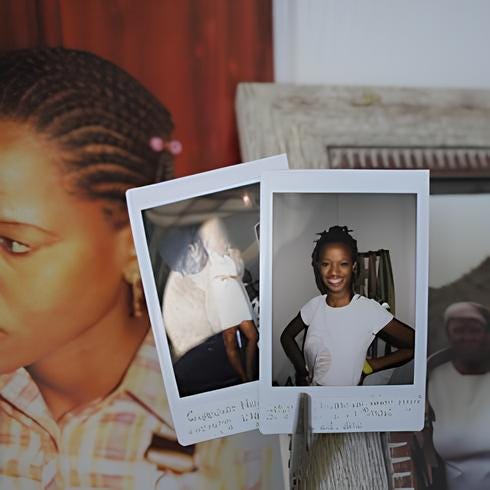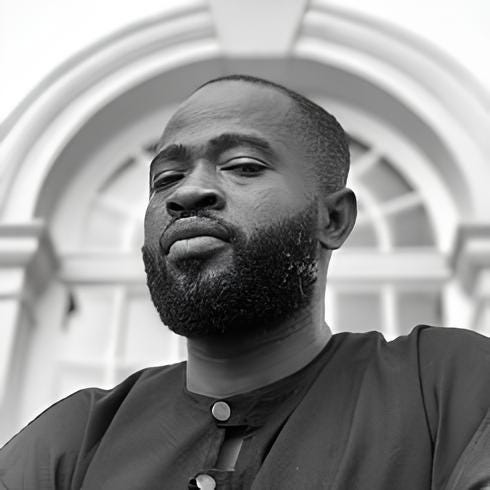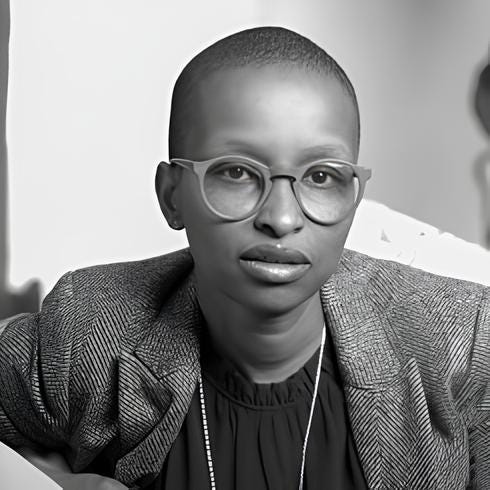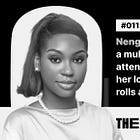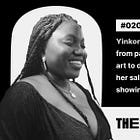Meet the winners of the 2024 Henrike Grohs Art Award
Kitso Lynn Lelliott was announced as the main prize winner of the 2024 Henrike Grohs Art Award. Wambui Kamiru Collymore and Frederick Ebenezer Okai were also named as runners-up.
Ten days ago, Goethe-Institut announced Kitso Lynn Lelliott as the winner of the 2024 Henrike Grohs Art Award. It also named Wambui Kamiru Collymore and Frederick Ebenezer Okai as runners-up.
According to the announcement, the top 3 winners—the main prize winner and the 2 runners-up—were selected from a pool of 690 applications from 40 countries across the African continent.
"We recognise the artists' strong commitment to re-anchoring knowledge beyond the conventional academic sphere. There is a notable effort to look back in order to move forward, finding anchors in different streams of existence,” the 2024 Jury shared.
“Frederick, Kitso and Wambui have demonstrated a keen awareness of their artistic identity and the power to navigate diverse influences.”
Read Also: Goethe-Institut announces the winner of the 2024 Henrike Grohs Art Award
Johannes Ebert, Secretary General of the Goethe-Institut, shared, “I sincerely congratulate the main winner Kitso Lynn Lelliott from Botswana, who has captured the hearts and minds of our esteemed jury members with exceptional talent and creativity, and the two deserving runners-up Wambui Kamiru Collymore from Kenya and Frederick Ebenezer Okai from Ghana.”
Kitso Lynn Lelliott, who is the 4th winner of the Henrike Grohs Art Award, will receive a 20 000€ cash prize and 10 000€ towards a publication of her work, according to the announcement. Wambui Kamiru Collymore and Frederick Ebenezer Okai will also receive a cash prize of 5.000€ each.
Read Also: Goethe-Institut announces the 21 shortlisted artists for the 2024 Henrike Grohs Art Award
Meet the winner and runners-up of the 2024 Henrike Grohs Art Award
The Henrike Grohs Art Award, inaugurated in 2018, is a biennial art prize conceived by the Goethe-Institut and the Grohs family in memory of the former Head of Goethe-Institut in Abidjan, Henrike Grohs.
Kitso Lynn Lelliott (Main Prize Winner)
Born in Botswana, Kitso Lynn Lelliott is currently based in Johannesburg, South Africa. Her practice moves between video installation, film and writing. She is preoccupied with enunciations from spaces beyond epistemic power and the crisis such epistemically disobedient articulations cause to hegemony.
Her work interrogates the ‘real’ as it is shaped through contesting epistemologies, their narratives and the form these took over the Atlantic during the formative episode that shaped the modern age.
Her work is an enactment of enunciating from elision and between historically subjugated subjectivities, privileging South-South relations in relation to yet imaginatively and epistemologically unmediated by the Global North.
In 2017 she was laureate of the Iwalewahaus art award and was a featured guest artist at The Flaherty Seminar 2018. In 2019 Lelliott won the NIHSS award for best visual arts. She was with the CHR until 2022 when she took up a senior lectureship with the University of the Witwatersrand.
“Kitso’s work, in particular, resonated with us for its articulation of disobedience and disruption. There is a firm affirmation of the necessity to look beyond traditional references to colonial powers,” the 2024 Jury noted.
“Notably, in considering Kitso’s work, we view it not as a final achievement but as a constant state of becoming—a metaphor for the artist herself. Kitso embodies a perpetual reinvention, eschewing the notion of a finished work in favour of one that exists and re-exists, signifying a continuous and evolving artistic journey.”
Read Also: Meet the 3 African artists shortlisted for the 2024 LOEWE FOUNDATION Craft Prize
Frederick Ebenezer Okai (Runner up)
Frederick Ebenezer Okai (1986) is a multidisciplinary artist based in Sunyani, Ghana. Okai's practice takes the form of sculpture, installation, video, sound, virtual and augmented reality, exploring the plastic possibilities of his primary material – clay.
Guided by a profound respect for ancestral wisdom, Okai embarks on extensive journeys, as a means of tapping into the rich tapestry of culture. As a pseudo-ethnographer, his collaborative practice highlights indigenous Ghanaian pottery making and gives reverence to the art's under-recognised artists, women.
In his praxis, clay becomes a repository of stories, a silent witness to the past while confronting contemporary concerns. Okai interrogates themes such as coexistence, spatial relations, and form.
His interest in the revolutionary potential of form informs the rigorous techniques he employs by breaking, welding, stacking, painting, spreading, stitching, and shifting familiar imagery to forge artistic possibilities that create new knowledge founded on an ample dose of good old play.
Read Also: Ghanaian artist Ibrahim Mahama wins Dia Art Foundation's inaugural Sam Gilliam Award
Wambui Kamiru Collymore
Born in Kenya, Wambui Wamae Kamiru Collymore has been developing artwork around the theme of colonialism, identity and independence in Africa.
Through her own work in contemporary art – mainly simulated experiences – Wambui tackles history, politics and social issues. Wambui creates installations with everyday objects. The works also have either a sound or video piece or both. Recent works include: All My Venus Days - 2022, Akili Ni Nywele Series II – 2021, Wakariru – 2019, Akili Ni Nywele – 2017, I'm moving out. Tomorrow – 2015, Your Name Betrays You - 2015, Who I Am, Who We Are - 2013 - Present and Harambee63 - 2013.
She is currently working on decoloniality, womanhood and “online dis-identity.” Wambui Kamiru holds an MSc in African Studies with a focus on Kenyan History from the University of Oxford. With this background, Wambui tells stories about the passage of time, through her artwork. She lives and works in Nairobi.
Read Also: Kuta Arts Foundation reveals the finalists of its 2024 Kuta Arts Residency program
Past winners of the Henrike Grohs Art Award winners are Gladys Kalichini, Zambia (2022), Jackie Karuti, Kenya (2020) and Em'kal Eyongakpa, Cameroon (2018).





